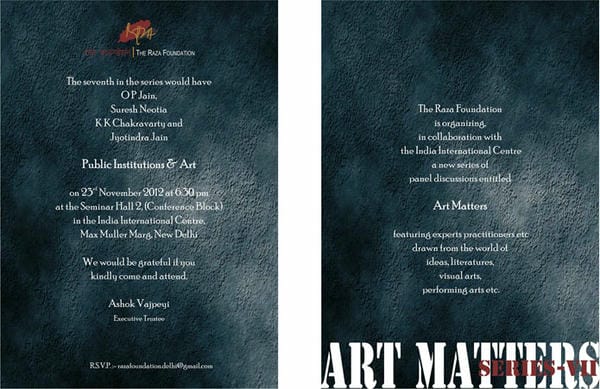
16-Nov-2012 12:00 AM
2946
The contemporary times stand witness to a constant deterioration of meaning of art and manipulation of theoretical social and political concepts as well as their practical significance. Whether they are questions as serious as social and political concerns of human rights or social exclusion affecting a dignified human survival, or as sensitive as the waning of interest in classical art forms, they call for an urgent need to revisit and discuss the prevalent conceptions.
Art has its unique way of reviving our soul from deadening monotonous routines through its multiple intricate expressions. Forming a singular perception of art or attributing a definitive meaning to it often reduces art from its fascinating complexity and expressive charm. This reductive approach confines art to its modernist understanding, which then fails to take cognizance of the artistic abstraction expressed through different forms and styles.
The Raza Foundation through its series ‘Art Matters’ provides a platform for open discussion on such issues. It endeavors not only to release the true essence of art from the clutches of definitive modernist approach in order to grasp myriad ways of extolling art, but also to stir up debate on the changing meanings of social and political theoretical concepts like rights, justice, liberty, citizenship, etc. Well known, renowned scholars and practitioners from all the diverse fields of arts, dance, music, social science, poetry, and so on are invited for this purpose.
Here, we publish the seventh panel discussion of ‘Art Matters’, titled ‘Public Institutions and Art’ featuring O. P. Jain, Suresh Neotia, K. K. Chakravarty and Jyotindra Jain.
Om Prakash Jain (born 1929) is an Indian art collector, patron and philanthropist. He is the Founder-President of the Sanskriti Pratishthan (Sankriti Foundation), established in 1979, which runs the Sanskriti Kendra Museums at Anandagram, Delhi. He has remained the convenor of the Indian National Trust for Art and Cultural Heritage (INTACH) for 15 years. He has been a promoter of Neemrana Fort Palace Hotels. Jain was born and brought up in a business family in Old Delhi, where his family has an office at Chawri Bazar. Without much formal education, he joined the family paper-trading business at an early age. It was a chance meeting with writer Mulk Raj Anand, in the 1970s, that inspired him to work for art and cultural heritage conservation.He spent many years collecting everyday functional objects, like kitchen and household items, made by artisans. In 1984, he set up a small museum with his private collection at the basement of his Kinari Bazaar house in Chandni Chowk area. 10 years later, the collection shifted to the Sanskriti Museum of Everyday Art, at Anandagram – an artist village, he established on the outskirts of Delhi.Subsequently, the Museum of Terracotta Art and Textile were also established.
Suresh Kumar Neotia was an Indian industrialist, entrepreneur, art collector, philanthropist and the co-founder of Ambuja Cements and associated companies. He was the chairman of the Group till 2009 when he relinquished the position in favor of his co-founder, Narotam Sekhsaria, and remained as the Chairman Emeritus of the Group until his death. He was a recipient of Harvard Business School - Economic Times Award and was involved in many social activities which included the promotion of cultural organizations such as Anamika Kala Sangam and Padatik. The Government of India awarded him the third highest civilian honour of the Padma Bhushan, in 2008, for his contributions to trade and industry.
Kalyan Kumar Chakravarty is an Indian historian, art historian, writer, action anthropologist, academician and administrator, known for his intercultural and cross-disciplinary research and activism. A retired officer of the Indian Administrative Service (IAS) of the 1970 batch (retired 2007), he was appointed Chairman of the Lalit Kala Akademi, India’s federal fine arts academy, in 2013. He has authored significant books on archaeology, rock art, art history, tribal issues, Jmuseology, public policy, philosophy of religion and art.
Jyotindra Jain (born 5 June 1943) is an Indian art and cultural historian, and museologist. A scholar on folk and ritual arts of India, he was the Director of the National Crafts Museum, New Delhi, Member Secretary and Professor (Cultural Archives), at Indira Gandhi National Centre for the Arts (IGNCA), New Delhi, and also Professor at the School of Arts and Aesthetics at Jawaharlal Nehru University, Delhi. He has published a number of books on Indian folk art, including, Ganga Devi: Tradition and Expression in Mithila Painting, Other Masters: Five Contemporary Folk and Tribal Artists of India and Kalighat Painting: Images from a Changing World. He has been an Alexander von Humboldt Fellow, a Homi Bhabha Fellow and a visiting Professor at the Center for the Study for World Religions, Harvard University, USA, and was awarded the Prince Claus Awards in 1998.
The event was organised at the Indian International Centre on 23rd of November 2012.